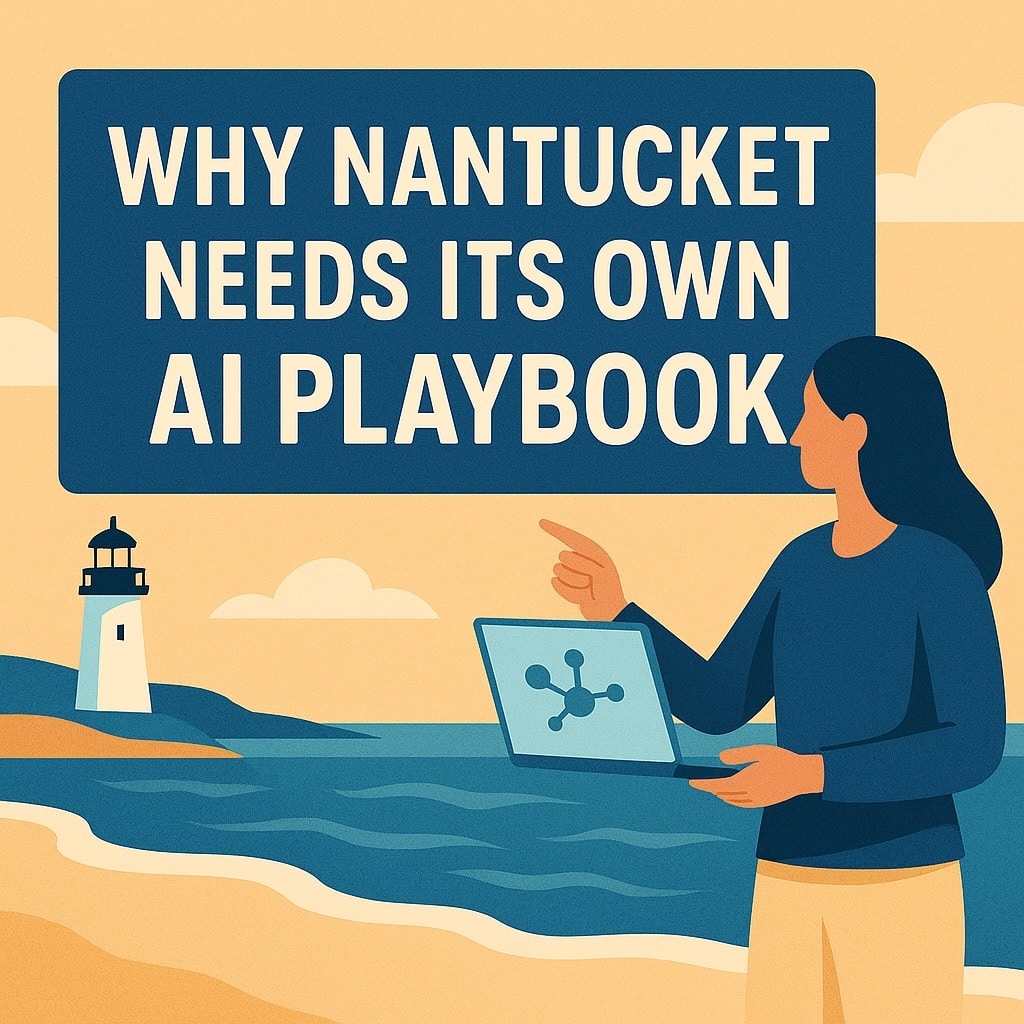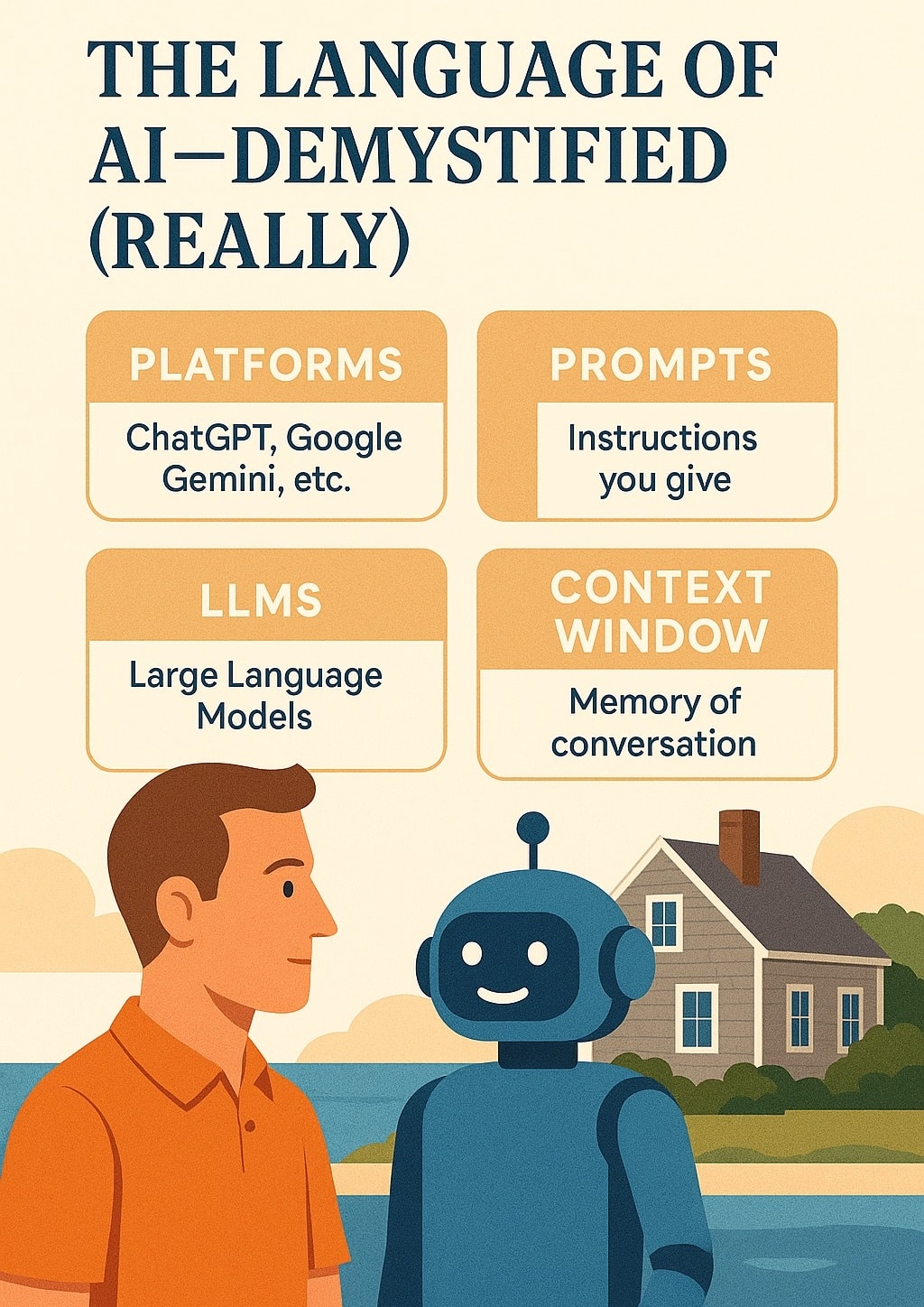
A homegrown guide to riding the wave of AI. The Nantucket way.
How much of your workweek is real leadership—and how much is routine, reactivity, or “just keeping up”? If you’re a Nantucket business owner or exec, that’s not a rhetorical question. This island’s pace is legendary. But the world’s pace is something else entirely. The AI era is no longer a Silicon Valley rumor; it’s our new weather system—and it’s not waiting for the next ferry.
Why Nantucket Needs Its Own AI Playbook

Let’s be honest: Nantucket is different. We prize human connection, trust, and a certain “do it right” sensibility. At the same time, every industry here—hospitality, real estate, nonprofits, education, even the conservationists—faces a tidal wave of new challenges. Labor crunches. Guest expectations. Fierce competition from off-island. The question isn’t if AI will change how we work. It’s whether Nantucket leaders will shape that change or let it shape them.
So, how do you get started—without feeling lost in jargon, or worse, replacing what’s special about your team and your brand?
Let’s break it down.
The Language of AI—Demystified (Really)

Heard the buzzwords—GPT, LLM, “context window,” “prompt engineering”—and wondered if it was all code for “not for me”? Here’s the thing: The core concepts are surprisingly approachable.
- Platforms are like the cars you drive—ChatGPT, Google Gemini, Anthropic Claude, and others.
- Large Language Models (LLMs) are the engines under the hood. They “think” and respond, but you steer.
- Prompts are simply the instructions you give. The better your directions, the better your results.
- Context window is just how much memory the AI keeps about your conversation—handy if you want continuity, like a staffer who actually remembers last Tuesday.
If you’ve ever given instructions to a new hire (“I need this done by five, here’s how I like it, double-check with me if unsure”), you already get the idea. Vague orders lead to predictable headaches. Clear, context-rich directions? That’s where the magic happens.
The Big Five—And Their Specialty Sidekicks
Think of the leading AI platforms as different kinds of guides:
- ChatGPT (OpenAI): The Swiss Army knife. Strong at conversation, writing, brainstorming, even image creation.
- Gemini (Google): Research king, seamlessly taps into Google’s universe. Great if your workflow is Google-based.
- Claude (Anthropic): The perfectionist. Especially sharp for detailed writing, coding, and analysis.
- DeepSeek: The up-and-comer. Good for free, quick takes—if you don’t mind your data touching international servers.
- Grok: The social media whiz, plugged right into X.
For special tasks, there’s a “sidekick” for everything: Perplexity for instant research, Midjourney for jaw-dropping images, Google VEO 3 for video, Hume and ElevenLabs for natural, humanlike voices (imagine a reservation system that sounds like your best host on their best day).
And Nantucket? You don’t need all of these at once. You just need to know they’re out there—and which one fits your next challenge.
The Real Trick: Mastering the Art of the Prompting
The biggest myth: “AI does everything for you.” Not quite.
Here’s what separates pros from frustrated newbies: prompting—the art of the ask.
Picture AI as a seasoned first mate. If you bark, “Plan a lesson,” you’ll get…well, something. But if you say,
“Act as a fifth-grade history teacher. Create a 45-minute lesson plan about Nantucket’s whaling history, including a fun opener, three facts, and a short quiz,”
—you get results you can actually use.
The same holds for business data:
“Analyze this property data” versus
“Analyze the last two years of property sales in ‘Sconset, which is attached, and compare price per square foot for ocean-view homes versus others. Present it in a table preceded by a heading and short summary.”
See the difference? The sharper your prompt, the better the outcome.
Enter the HELP Framework
A local business twist on the basics:
- Humanize: Assign a role. (“Act as an experienced Nantucket innkeeper…”)
- Expand: Be specific. (“Give me a week-by-week guest arrival forecast for summer…”)
- Leverage: Play to the AI’s strengths. Use ChatGPT for conversation, Gemini for research, Claude for writing.
- Perfect: Don’t settle for the first try. Refine, iterate, get curious.
It’s not about getting it perfect—just getting started and learning as you go.
Human-In-Command: Nantucket’s Unwritten Rule
Let’s cut to the chase: AI is here to help, not to stand in for real people. The savviest businesses—hotels, shops, agencies—get that there’s a world of difference between fast automation and real human warmth.
Sure, AI can zip through stacks of guest reviews and spit out tidy summaries. But no algorithm can match your front desk manager’s warmth, or a local broker’s deep roots and rapport with longtime clients. The trust you’ve built on Nantucket? That’s not something a bot can conjure.
There’s just no substitute for real human care.
Still, what can your AI assistant handle? Customer inquiries 24/7, real time data processing and automated reports. It can spot booking trends and alert you to special concierge requests. It can organize and publish your new website content and blogs. It’s great for certain professional documents and can send newsletters, draft press releases. When drafting emails, it can even remember a guest’s go-to room- whatever the details of the job, it can take into account.
Getting this balance right? That’s not just practical—it’s classic Nantucket.
A Fresh Take on Hospitality, Real Estate, and Island Life
For hoteliers and restaurants:
Picture AI-powered booking that’s lightning-fast. Chatbots that actually sound helpful and which can even offer sophisticated virtual tours. Pricing that shifts with an expertly calculated forecast. Tailored messages that make every regular feel special, all without piling extra work on your team.
For real estate:
Market analysis tools that update daily. Automated descriptions and virtual tours that let you focus on high-touch deals, not copy-paste work. Property management systems that flag issues before guests ever complain.
For nonprofits and community orgs:
Grant proposals, press releases, donor reports—drafted or refined by AI, with your unique voice and data.
For education and healthcare:
Personalized learning plans for every student. Faster patient communications—without ever replacing the teacher or nurse’s human touch.
Is this all pie-in-the-sky? Not anymore.
Where to Start: The Nantucket Roadmap
Identify One Pilot Project
Choose a “small but mighty” initiative—a newsletter rewrite, a data dashboard, a chatbot for FAQs. Make it relevant, make it visible.
Learn Prompting as a Team
Run a staff workshop. Share wins and flops. Treat this as core professional development, not just an IT thing.
Build Custom AI Assistants
Start with off-the-shelf (think: ChatGPT’s “Custom GPTs” or ElevenLabs for voice tasks). Gradually feed in your own data, policies, and protocols.
Not sure what fits your sector? Ask peers, try a tool, or—yes—prompt the AI itself: “Give me three pilot project ideas for a Nantucket real estate office/hotel/nonprofit.” You’ll be surprised by the quality (and local relevance) of the answers.
The Nantucket Standard: Ethics, Inclusion, and Trust
It’s not enough to just “use AI.” How you use it matters. On an island built on relationships, the rules are different:
- Privacy comes first: The Nantucket Standard means transparent data use—always tell customers and clients when AI is involved. Responsible Ai features for your customers should include agreements to terms of services and links to AI policy and FAQ pages.
- People first, always: Let technology lift up your frontline team, not push them aside.
- Be open about it: Tell your community and your customers how AI is making things smoother behind the scenes. AI as it stands has the capabilities to make things smoother and easier behind the scenes- saving your staff time and energy, which they can use to focus on the customer experience.
- Set limits where it matters: AI is no doubt a game changer, but it’s not one-size-fits-all. Lay down clear rules for your organization, staff and contractors. Your AI use case policy is the governing document for this and sets the scene for further processes, automations and SOPs.
Some things are just too important to leave to algorithms. The same goes for your AI use policy. Staff training and understood processes are a must.
Bottom line? Use AI to bring out the best in your people—not to bench them.
Your Moment to Lead
Islanders know: you can’t change the wind, but you can shift your sails. Right now, AI is that steady breeze. The businesses that move forward with care—with a clear head, steady hand, and the Nantucket way—will be the ones setting the course, not scrambling to keep up.So, where do you begin? Try a tool. Run a staff prompt-off. Pilot a project. Attend a workshop (or host one). If you wait, you’ll be catching up. If you move now, you’ll be out front—and that’s where Nantucket’s best have always been.
Ready to try your first AI pilot? Need help designing prompts or finding the right tool? Reach out. The next chapter of Nantucket business leadership is waiting—and it’s more human than you think.

